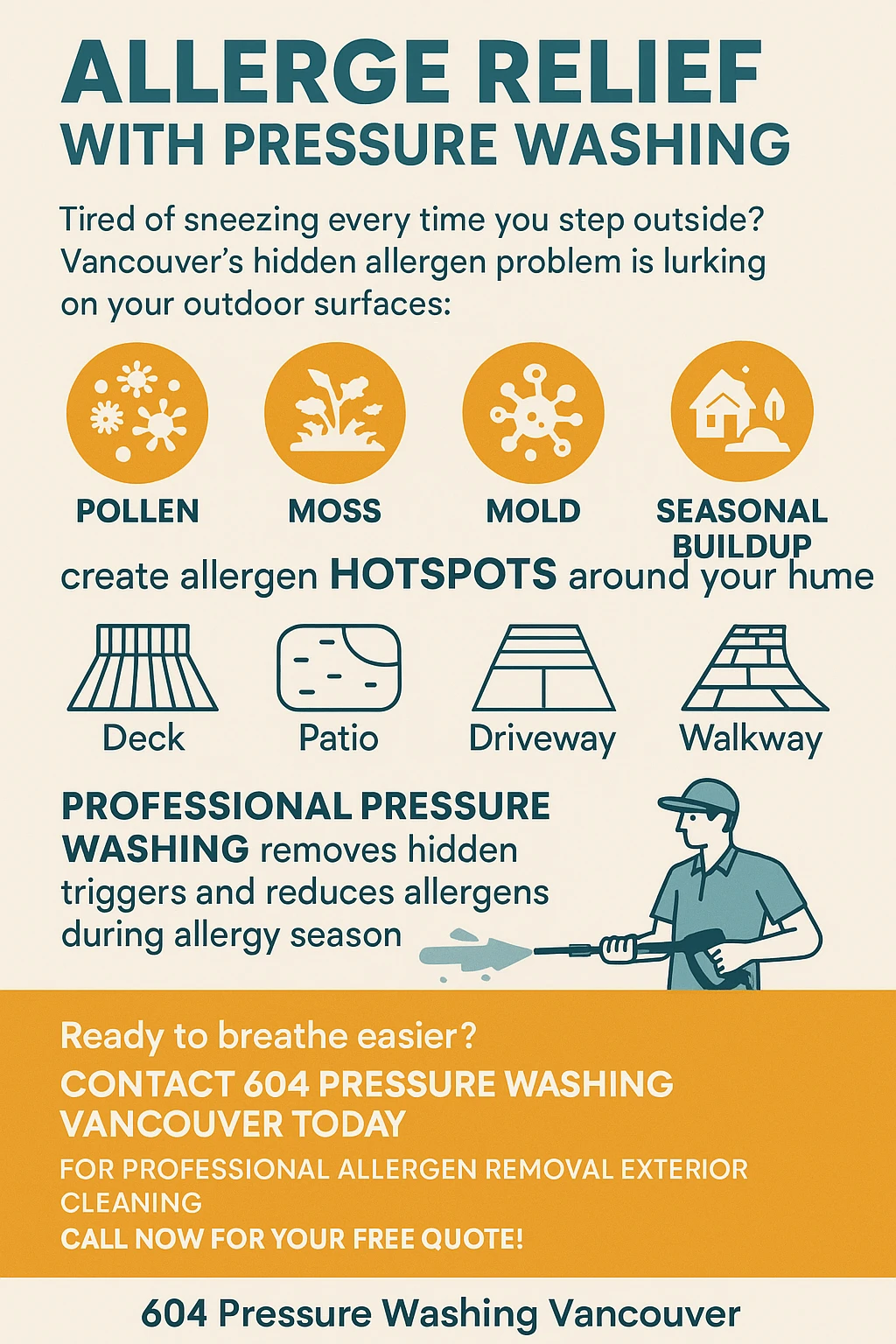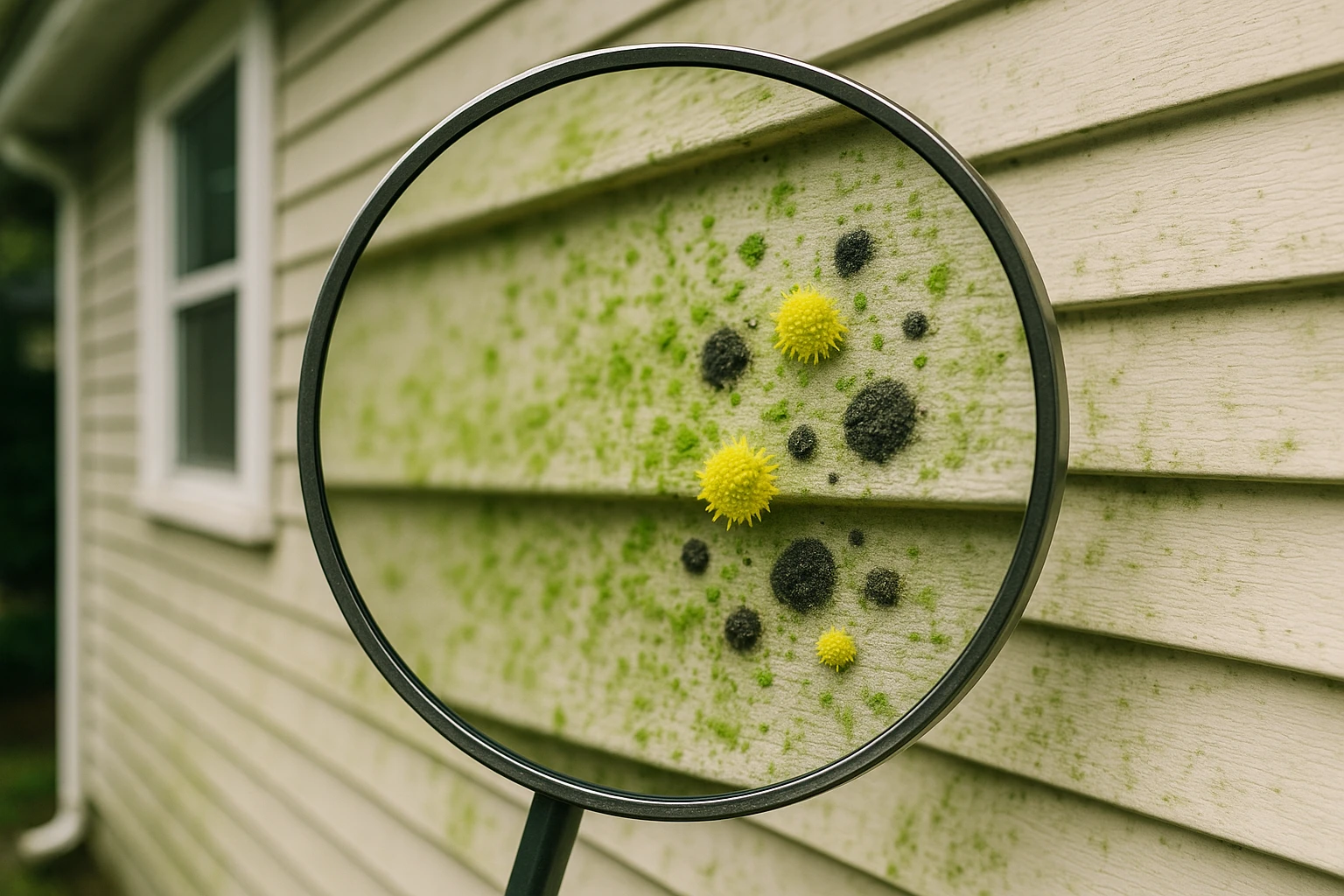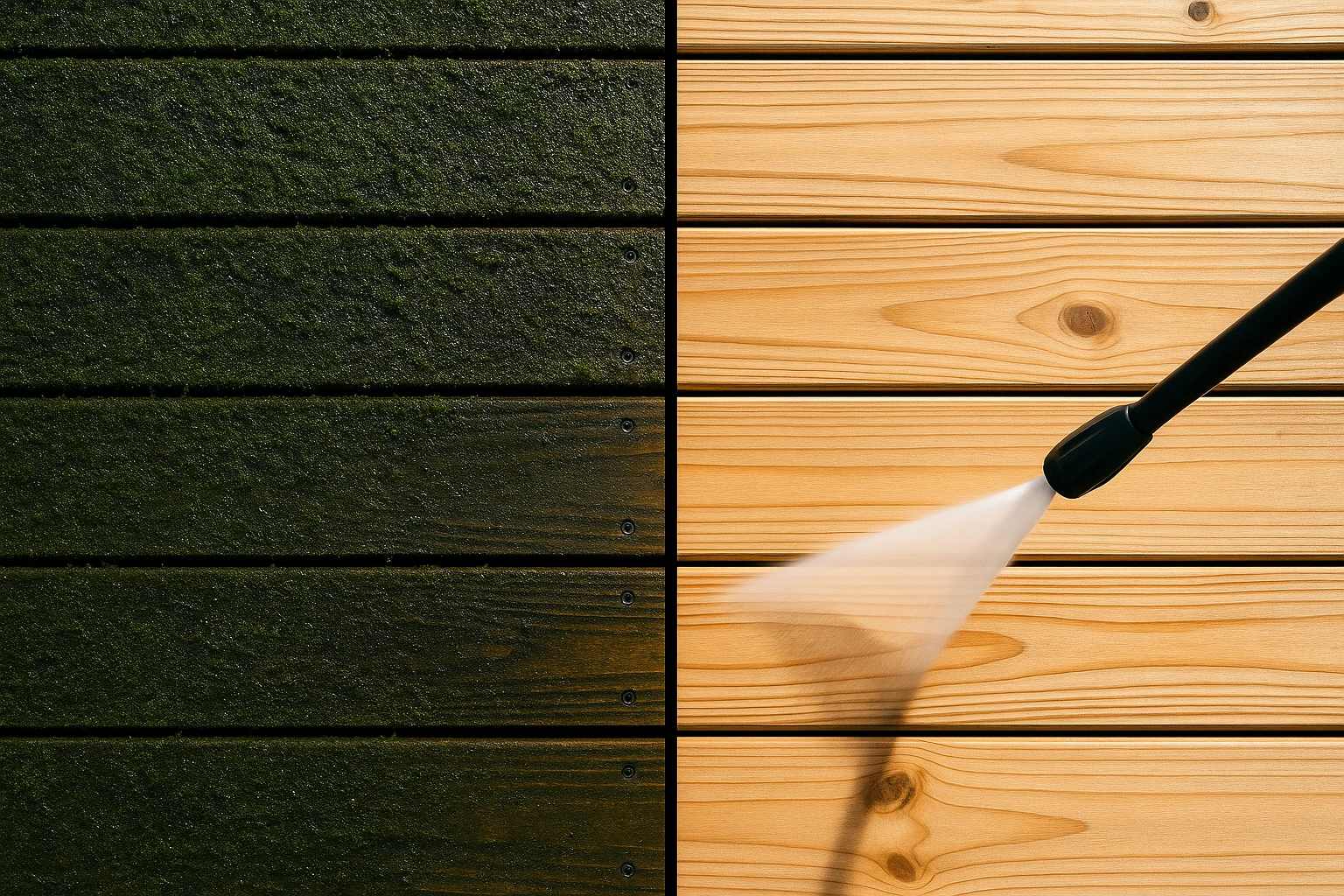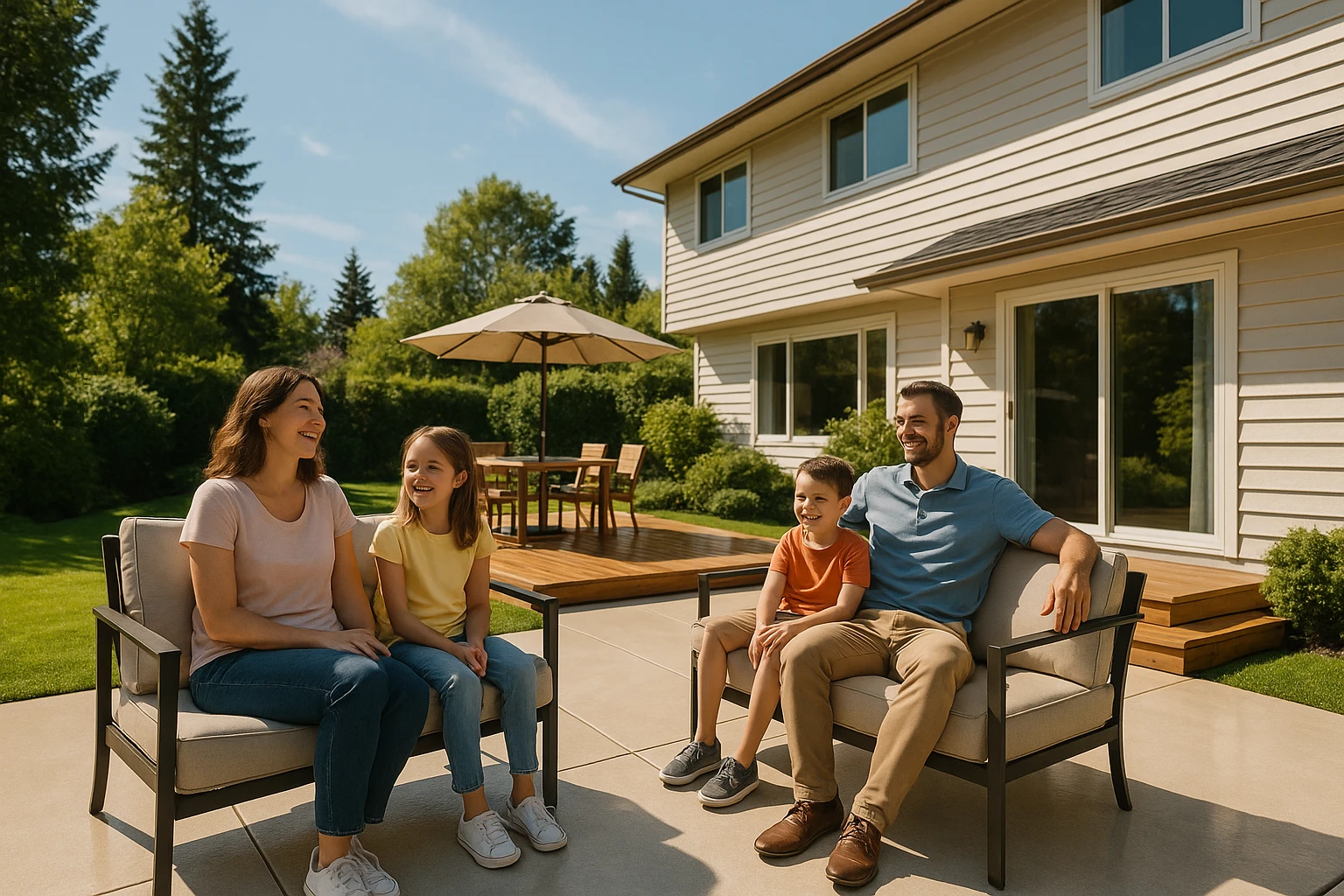Vancouver’s Hidden Allergen Problem: How Pressure Washing Can Reduce Outdoor Allergies Around Your Home
Tired of dealing with endless sneezing and watery eyes every time you step outside? You might be surprised to learn that your home’s exterior surfaces are harboring allergens that could be making your outdoor allergy symptoms worse than they need to be.
Picture this: you’re hosting a summer BBQ in your backyard, and half your guests are sniffling and rubbing their eyes. While you might blame the season’s pollen count, the real culprit could be lurking right on your deck, siding, and walkways. Living in Vancouver means dealing with our famously damp climate, which creates the perfect breeding ground for mold, mildew, and algae – all major allergen triggers that cling to outdoor surfaces around your home. What’s even more frustrating is that these allergens don’t just disappear with a light rinse from your garden hose.
The good news? There’s a surprisingly effective solution that most homeowners overlook: pressure washing. This isn’t just about making your home look Instagram-worthy (though that’s definitely a bonus). Regular pressure washing can actually transform your outdoor spaces into allergy-friendly zones by removing the microscopic troublemakers that have been making your life miserable. From pollen-coated patios to algae-covered siding, pressure washing targets the root causes of outdoor allergies right where they live.
Key Outtakes:
- Vancouver’s wet climate creates ideal conditions for allergen buildup on home exteriors, including mold, mildew, algae, and trapped pollen
- Pressure washing removes allergens that traditional cleaning methods can’t tackle, providing immediate relief for allergy sufferers
- Regular pressure washing prevents long-term allergen accumulation and can significantly improve air quality around your home
- The most effective approach combines proper timing, appropriate pressure settings, and eco-friendly cleaning solutions
- Annual or bi-annual professional pressure washing provides the best results for maintaining an allergen-free outdoor environment

Vancouver’s Unique Allergen Challenge: Why Our Climate Makes Things Worse
Vancouver’s climate is basically a recipe for allergen disaster, and if you’ve lived here for any length of time, you’ve probably noticed how your outdoor spaces seem to attract every possible irritant. With an average of 161 rainy days per year, our city creates the perfect storm for allergen accumulation that goes way beyond what most other regions experience. The constant moisture doesn’t just make everything green and beautiful – it also turns your home’s exterior into a magnet for mold, mildew, algae, and other microscopic troublemakers that can trigger allergic reactions.
What makes Vancouver particularly challenging is how our mild, wet winters prevent the natural “reset” that freezing temperatures provide in other climates. Instead of getting a seasonal break from allergens, we’re dealing with year-round accumulation that builds up layers upon layers on our decks, siding, walkways, and outdoor furniture. This isn’t just about aesthetics – these surfaces become reservoirs for allergens that get stirred up every time there’s a breeze or when you’re spending time outdoors.
The combination of frequent rainfall and moderate temperatures creates ideal conditions for organic growth that thrives in our region. Moss creeps across concrete surfaces, algae forms slimy films on siding, and mildew takes up residence in every damp corner it can find. These aren’t just unsightly – they’re actively releasing spores and particles into the air around your home, creating an allergen cloud that follows you from your front door to your backyard patio.

How Outdoor Allergens Accumulate on Your Property
Understanding how allergens build up around your home is like solving a mystery that’s been hiding in plain sight. The process starts innocently enough with everyday weather patterns, but before you know it, your outdoor spaces have become allergen factories working overtime to make your life uncomfortable. Rain doesn’t just wash things clean like we might hope – it actually creates the perfect conditions for allergen-producing organisms to set up shop and multiply.
Pollen is probably the most obvious culprit, and in Vancouver, we get hit with multiple pollen seasons throughout the year. Tree pollen arrives in early spring, followed by grass pollen in late spring and early summer, then weed pollen carries us through fall. But here’s the thing most people don’t realize: pollen doesn’t just blow away after a few days. It gets trapped in the textured surfaces of your deck boards, settles into the crevices of your siding, and creates sticky films on your outdoor furniture that act like allergen magnets for months.
Mold and mildew spores are even more persistent than pollen, and they love Vancouver’s consistently damp conditions. These microscopic organisms don’t need soil to grow – they’re perfectly happy setting up colonies on your concrete driveway, wooden deck, or vinyl siding. Every time it rains, these surfaces get a fresh drink of water that helps existing mold colonies flourish and spread. What starts as barely visible discoloration quickly becomes a full-blown allergen production facility right outside your door.
The real problem occurs when these different allergens start working together. Pollen provides nutrients for mold growth, while algae creates slippery biofilms that trap even more particles. Dust mites, which are major allergen producers, thrive in the organic matter that accumulates when these other substances break down. It’s like having a perfect storm of allergen activity happening right on your property, and traditional cleaning methods just move things around rather than eliminating the root cause.

The Science Behind Pressure Washing and Allergen Removal
Now that we understand the problem, let’s dive into why pressure washing is such an effective solution – and it’s not just about blasting everything with water until it looks clean. The science behind pressure washing for allergen removal involves understanding how different types of contaminants bond to surfaces and what it takes to break those bonds effectively. When done properly, pressure washing doesn’t just clean surfaces; it actually removes the microscopic structures where allergens live and reproduce.
The key lies in the combination of water pressure, temperature, and cleaning solutions that work together to break down biofilms and organic matter. Allergens like mold spores and pollen don’t just sit on top of surfaces – they actually embed themselves in tiny pores and crevices that regular cleaning can’t reach. High-pressure water creates the mechanical action needed to dislodge these particles from their hiding spots, while heated water helps dissolve the organic compounds that help them stick in the first place.
What makes Vancouver’s weather patterns particularly challenging is that our frequent light rain creates ideal conditions for biofilm formation. These are thin, slimy layers that form when bacteria, algae, and other microorganisms group together on surfaces. Biofilms are like apartment buildings for allergens – they provide protection, nutrients, and a perfect environment for reproduction. Regular garden hose pressure isn’t nearly enough to break through these protective layers, but professional-grade pressure washing can penetrate and eliminate them completely.
The cleaning solutions used in modern pressure washing are specifically designed to tackle the types of organic growth that thrive in our climate. These biodegradable compounds work by breaking down the cellular structures of mold, mildew, and algae while helping to neutralize allergens at the molecular level. Unlike harsh chemicals that might temporarily mask the problem, these solutions actually eliminate the source of allergen production, giving you lasting relief rather than just a quick fix.
Temperature plays a crucial role in the effectiveness of allergen removal through pressure washing. Hot water doesn’t just help with cleaning power – it actually denatures proteins in allergens, making them less likely to trigger reactions even if microscopic traces remain. This is particularly important for stubborn allergens like dust mite waste products and certain types of mold spores that are resistant to cold water treatment.

Soft Washing vs. Traditional Pressure Washing for Allergen Control
While we’ve been talking about pressure washing, there’s actually a gentler cousin called soft washing that’s becoming increasingly popular for allergen control, especially on delicate surfaces around your home. The difference isn’t just about water pressure – it’s about taking a more targeted approach to allergen removal that prioritizes effectiveness over brute force. Understanding when to use each method can make the difference between a job that looks good and one that actually solves your allergen problems long-term.
Soft washing uses lower water pressure combined with specialized cleaning solutions that do most of the heavy lifting when it comes to breaking down organic growth. This approach is particularly effective for removing the types of allergens that thrive on surfaces like vinyl siding, painted wood, and roofing materials that might be damaged by high-pressure washing. The cleaning solutions used in soft washing are designed to penetrate biofilms and kill allergen-producing organisms at the source, rather than just blasting them away.
The beauty of soft washing for allergen control is that it addresses the root cause of the problem rather than just treating the symptoms. When you soft wash a surface, you’re not just removing visible mold and mildew – you’re actually eliminating the microscopic structures that allow these organisms to regrow. This means longer-lasting results and less frequent need for cleaning, which is particularly important for Vancouver homeowners dealing with our persistently damp conditions.
Traditional pressure washing still has its place, especially for hard surfaces like concrete driveways, brick walkways, and stone patios where allergens can hide in deep pores and crevices. The mechanical action of high-pressure water is irreplaceable for removing ground-in pollen, embedded dirt, and stubborn organic stains that have had months or years to set in. For these surfaces, the combination of pressure and cleaning solutions creates a one-two punch that eliminates both current allergens and the conditions that allow them to return.
The decision between soft washing and traditional pressure washing often comes down to the specific surfaces you’re dealing with and the types of allergens you’re targeting. Mixed-material homes – which are common in Vancouver – often benefit from a combination approach where different techniques are used on different surfaces. Your wooden deck might get soft washed while your concrete driveway gets the full pressure treatment, all as part of a comprehensive allergen reduction strategy.
Timing Your Pressure Washing for Maximum Allergen Relief
Getting the timing right for your pressure washing can literally make the difference between temporary relief and lasting allergen control, and this is where many Vancouver homeowners miss the mark. The temptation is to wait until surfaces look visibly dirty or until allergy symptoms become unbearable, but by then, you’re already fighting an uphill battle against established allergen colonies. The key is understanding the seasonal patterns of allergen accumulation in our region and staying ahead of the curve.
Spring is typically the best time for your major annual pressure washing, ideally scheduled for late April or early May when tree pollen season is winding down but before the heavy moss and algae growth of summer begins. This timing allows you to clear away the winter’s accumulation of organic matter while removing the sticky tree pollen that would otherwise provide nutrients for mold and mildew growth throughout the warmer months. It’s like giving your property a fresh start before the growing season really kicks into high gear.
Summer pressure washing should focus on maintenance and problem areas, particularly surfaces that see heavy use or have shown signs of rapid algae growth. This is when Vancouver’s warm, humid conditions create perfect breeding grounds for allergen-producing organisms, and staying on top of hot spots can prevent small problems from becoming major allergen sources. Many homeowners find that a mid-summer touch-up washing of high-traffic areas like decks and patios makes a significant difference in their outdoor comfort levels.
Fall cleaning is often overlooked but can be incredibly effective for allergen control, especially if you’re dealing with persistent mold or mildew issues. This is when you want to eliminate the organic matter that has built up over the growing season before it has a chance to decompose and create fertile ground for next year’s allergen production. Fall pressure washing also removes the fallen leaves and debris that can trap moisture against surfaces throughout our wet winter months.
The timing of your pressure washing should also consider weather patterns and forecasts. Ideally, you want to pressure wash when you have several days of dry weather ahead, allowing surfaces to dry completely before the next rain cycle. This prevents the immediate recontamination that can occur when freshly cleaned surfaces are exposed to moisture before they’ve had a chance to fully dry and develop natural resistance to new growth.
Professional vs. DIY: What Works Best for Allergen Control
The decision between hiring professionals and tackling pressure washing yourself goes beyond just convenience – it can significantly impact how effective your allergen control efforts actually are. While DIY pressure washing might seem straightforward, achieving the level of allergen removal that makes a real difference in your daily comfort requires understanding the science behind different cleaning approaches and having access to equipment that most homeowners don’t own.
Professional pressure washing services bring specialized knowledge about which cleaning solutions work best for different types of allergens and surfaces. They understand the difference between surface cleaning and deep allergen removal, and they have access to commercial-grade equipment that can achieve water temperatures and pressures that consumer-grade machines simply can’t match. This isn’t just about getting things cleaner – it’s about achieving the level of sanitation needed to actually eliminate allergen sources rather than just moving them around.
The equipment difference is particularly important when dealing with tough allergens like embedded mold spores or persistent biofilms. Professional-grade pressure washers can maintain consistent pressure and temperature while delivering specialized cleaning solutions that break down organic matter at the molecular level. Consumer machines often struggle with consistent performance and lack the power needed to penetrate deep into porous surfaces where allergens hide.
However, DIY pressure washing does have its place in an overall allergen control strategy, particularly for maintenance between professional cleanings. If you’re dealing with specific problem areas or want to tackle light pollen buildup before it becomes a bigger issue, a consumer-grade pressure washer can be effective for surface-level cleaning. The key is understanding its limitations and not expecting it to deliver the same level of allergen elimination as professional treatment.
Cost considerations often drive the DIY vs. professional decision, but it’s important to factor in the total cost of ownership when making this choice. Professional pressure washing might seem expensive upfront, but when you consider the cost of equipment purchase, maintenance, cleaning solutions, and your time, the professional option often provides better value – especially when you factor in the superior allergen removal results that can significantly improve your quality of life.
Frequently Asked Questions
How often should I pressure wash my home’s exterior to control allergens?
For optimal allergen control in Vancouver’s climate, most homes benefit from professional pressure washing once or twice per year, with spring being the most critical timing. Properties with heavy tree coverage, north-facing surfaces, or ongoing mold issues may need more frequent treatment. The key is to establish a regular schedule rather than waiting for visible problems to develop, as allergen-producing organisms often establish colonies long before they become noticeable to the naked eye.
Can pressure washing actually make allergies worse by stirring up allergens?
When done properly, pressure washing eliminates allergens rather than just redistributing them, but technique matters significantly. Professional pressure washing uses containment methods and cleaning solutions that neutralize allergens as they’re removed from surfaces. DIY pressure washing can potentially stir up allergens if done without proper precautions, which is why many allergy sufferers choose to hire professionals or take steps to minimize exposure during the cleaning process.
What’s the difference between regular pressure washing and allergen-focused cleaning?
Allergen-focused pressure washing goes beyond surface cleaning to target the microscopic organisms and biofilms where allergens live and reproduce. This approach uses specialized cleaning solutions designed to break down organic matter and eliminate spores, rather than just blasting away visible dirt and grime. The process also includes treating areas that might look clean but harbor hidden allergen sources, such as the undersides of deck boards or between siding panels.
Is soft washing or traditional pressure washing better for allergy sufferers?
Both methods have their place in allergen control, and the best approach often involves using both techniques on different surfaces around your property. Soft washing is particularly effective for eliminating the organic growth that produces allergens, while traditional pressure washing excels at removing embedded particles from hard surfaces. The choice depends on your specific surfaces and the types of allergens you’re dealing with, which is why professional assessment can be valuable.
How long after pressure washing will I notice improvement in my allergies?
Many people notice immediate improvement in their outdoor comfort levels, especially if they’ve been dealing with visible mold or heavy pollen accumulation. However, the full allergen-reducing benefits typically develop over several days as surfaces dry completely and previously stirred-up particles settle or wash away naturally. The most significant improvements usually become apparent within a week of professional treatment, with benefits lasting several months when proper techniques are used.
Wrapping Up
Living with outdoor allergies in Vancouver doesn’t have to mean avoiding your own backyard or constantly battling symptoms every time you step outside. Understanding that your home’s exterior surfaces are likely harboring the very allergens that make your life miserable is the first step toward taking control of your outdoor environment. From pollen-coated decks to mold-covered siding, these surfaces act as reservoirs for allergens that traditional cleaning methods simply can’t tackle effectively.
The solution isn’t just about making your home look better – it’s about creating a genuinely healthier outdoor environment through targeted pressure washing that eliminates allergens at their source. Whether you choose professional services or decide to tackle some of the work yourself, the key is understanding that effective allergen control requires more than just surface cleaning. It demands an approach that addresses the biofilms, organic matter, and microscopic colonies where allergens live and reproduce.
Regular pressure washing, properly timed and executed, can transform your outdoor spaces from allergen factories into comfortable, breathable environments where you can actually enjoy spending time. The investment in professional allergen-focused cleaning pays dividends not just in improved air quality, but in the freedom to use your outdoor spaces without constantly battling watery eyes, sneezing, and respiratory irritation. Your deck, patio, and walkways can become assets rather than obstacles to outdoor enjoyment, giving you back the outdoor lifestyle that Vancouver’s beautiful setting promises.

